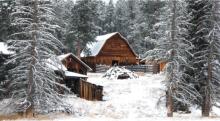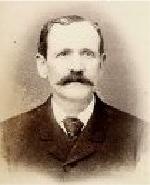Deadwood's Chinese Heritage & 12 Girls Band of today




Laura & Dustin Floyd


Despite the continued absence of a Chinese population, Miss Kitty's Casino and devoted individuals brought back the Chinese New Year celebration to Deadwood in 1990. In its historic heyday, Chinese New Year festivities lasted days. Due to Fee Lee Wong's established Wing Tsue Emporium business and his community prominence, the newspaper often wrote about his activities during the forty-three years he lived in Deadwood (1876-1919). On February 27, 1882, the Black Hills Daily Times described Wing Tsue's grand New Year feast offering of “roast pork, stew, rice, whisky and other Chinese delicacies” and noted “China hall was crowded by whites and Chinamen, the former out of curiosity and the latter to have a good time.” Music, singing, firecrackers, and a drinking game all contributed to the closing ceremony. “The racket was kept up until late into the night and a string of white men and ladies were continually going and coming from the strange night. The scene was one that will long be remembered by all who witnessed it.”
Over a century later, a tamer but no less involved annual celebration includes the entrance of the emperor and the empress, a short parade, fireworks, a lion dance, martial arts demonstrations, cultural education, a presentation related to the current year's animal of the Chinese Zodiac (2007 is the Year of the Pig/Boar) and ethnic cuisine at Chinatown Café.
Only in recent years has it been conveyed to the world that historic Deadwood had a significant Chinese presence and
Select => Deadwood Magazine for the complete article.
In today's world, I have discovered a new Chinese musical group called the “12 Girls Band” which are now 12 plus 1. Actually, they have a very large unseen support group of musicans, staging personnel, and management. The “girls” are very beautiful and talented. They have taken 1500 years of Chinese music culture and blended their sound into popular songs to share with the whole world. Their historical instruments provide a unique listening experience.
Twelve Girls Band (simplified Chinese: 女子十二乐坊; traditional Chinese: 女子十二樂坊; pinyin: Nǚzǐ shí'èr Yùefǎng, sometimes abbreviated to 女樂 or 女乐) are an all female Chinese musical group that initially consisted of twelve members before the addition of a thirteenth. Twelve Girls Band use traditional Chinese instruments to play both traditional Chinese and Western song. Formed on June 18, 2001, the women were selected by audition from more than 4,000 contestants. Each woman is classically-trained, and the band members come from various conservatories in the People's Republic of China (PRC), including the China Academy of Music, the Chinese National Orchestra, and the Central Conservatory of Music.
Chinese numerology gave Wang Xiao-Jing the idea for the Twelve Girls Band. When Xiao-Jing decided he wanted to create a female ensemble, he knew it needed 12 members. Per Chinese mythology it is the twelve jinchai (12 hairpins) representing womanhood. For the new project, the women were inspired by the art of the Yue Fang, the ensembles who played in the Tang Dynasty courts during the years A.D. 618 to 907.
The group debuted their modern compositions on ancient instruments in China and Japan during the Northern summer of 2003. In Japan their debut album topped the charts for 30 weeks. Their debut album, entitled "Eastern Energy," was released in North America in August 2004 with cover versions of Coldplay's "Clocks" and Enya's "Only Time" included, and a massive television advertising campaign announcing the group's arrival.
Among the instruments used by the women: erhu (Chinese fiddle), pipa (pear-shaped lute), guzheng (zither), yangqin (hammered dulcimer), dizi (transverse flute), and xiao (vertical flute). Occasionally, the duxianqin (single-stringed zither) and hulusi (three-piped gourd flute) are employed.
The following videos are representative of their appeal. The first video provides a song with a slide picture presentation of some of the Girls and their instruments. The second video is a favorite of mine, called "Shinning Energy". The third video is a classic favorite "El Condor Pasa". The last video is a John Denver Country Road version they call "Village Road".
I hope you enjoy this cultural connection by music and Judith Wong's interesting Deadwood's Chinese Hertiage article
Play Only One Video at a Time
From the Deadwood Blog , 22 Feb 2010:
The Chinese New Year Celebration in Deadwood on Saturday, March 6, 2010 traces its origin back to the late 1800’s and early 1900’s. At that time Deadwood had the second largest Chinese population in the United States, second only to San Francisco, thanks to the opportunities such as work in the gold mines and on the railroads.
Today the culture of these proud people lives on in legend and memory in an event such as the Chinese New Year celebration, which has been held each year since 1990 at Miss Kitty’s Gambling Saloon/Chinatown Café at 649 Main Street in Deadwood.
Because the Chinese Lunar Calendar is 2,637 years older than ours, this is the year 4647 and it is the Year of the Tiger. People born in this year or in 1926, 1938, 1950, 1962, 1974, 1986, or 1998 are forthright and sensitive, possess great courage.
There will be various demonstrations by nearby martial arts groups in Miss Kitty’s Casino at 1 p.m. Chinese cuisine will be available during restaurant hours (11:30 a.m. to 10 p.m.) at the Chinatown Café.




0 comments:
Post a Comment